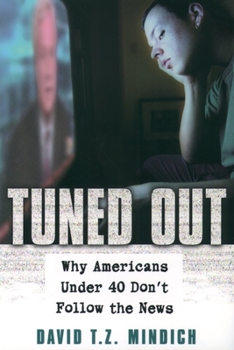Tuned Out: Why Americans Under 40 Don't Follow the News
Select Format
Select Condition 
Book Overview
At a rate never before seen in American history, young adults are abandoning traditional news media. Tuned Out: Why Americans Under 40 Don't Follow the News examines the reasons behind this problem and its consequences for American society. Author David T. Z. Mindich speaks directly to young people to discover why some tune in while others tune out--and how America might help them tune back in.
Based on discussions with young adults from across...
Format:Paperback
Language:English
ISBN:0195161416
ISBN13:9780195161410
Release Date:September 2004
Publisher:Oxford University Press, USA
Length:192 Pages
Weight:0.64 lbs.
Dimensions:0.5" x 6.2" x 9.1"
Related Subjects
Architecture Arts, Music & Photography Communication Communication & Journalism Communication & Media Studies Communications Criticism Historical Study & Educational Resources History Humanities Journalism Journalism & Nonfiction Media Studies Politics & Social Sciences Reference Social History Social Science Social Sciences Textbooks Words, Language & Grammar WritingCustomer Reviews
4 ratings
Nostalgic For An Era That Wasn't That Great
Published by Thriftbooks.com User , 18 years ago
The author speaks wistfully of when most people watched network news. But when the three networks news programs had that power, they abused it. Two decades ago Peter Jennings gave an interview in which he said that his job was not merely to present the news but also to interpret it. What if you don't like the way a newscaster is interpreting the news, yet many millions watch that newscaster? Nowadays nightly network news audiences have dropped to the point where it doesn't matter how a network news anchor interprets the news, because the audiences are small. The author mentions favorably how Walter Cronkite had a big impact when he announced that the US was in a quagmire in Vietnam. But that was an opinion, not news. The author is correct that the country is worse off for people not following the news. But the country is better off for the demise of those dinosaurs, the half hour network news broadcast and the weekly newsmagazine.
Must Read TV
Published by Thriftbooks.com User , 19 years ago
With all that is going on in the world right now, it's stunning to think how many people are out of touch with day to day news. The newspaper is now nothing more than the front page, maybe an eye-catching headline and the more importantly the horoscope and ads for groceries or cars, maybe the sports schedule or boxscore. TV news is reduced to glitz, glamour, Hollywood dirt, Washington scandal and the dog caught down a drain. At no time in world history has there been so much readily available media to the masses, sometimes unwillingly pumped into your subconscious by airports, banks and post offices on blaring televisions that have no off switch.. and this book eloquently examines why more watch less. To find out why so many have so often decided to watch or read so little news, Mindich hit the road; his journey is related as a classroom of the mind, challenging assumptions and explaining indifference. No one in the business of journalism - and lest no one be fooled, it is a business, a very profitable business for those who control it - and no one who is raising a child in this 21st century should miss a chance to learn why Americans under 40 are 'tuning out.' I heartily recommend educators who want their students to be informed about the world around them, to find a copy for their classroom.
Required Reading
Published by Thriftbooks.com User , 19 years ago
With statistics, personal anecdotes and a fine writing style, Mindich does an excellent job of describing a simmering crisis - the failure of young people to follow serious news coverage. Even better, Mindich describes creative solutions to this problem. If you're a teacher, parent, student, journalist or politician, then consider Tuned Out to be required reading!
The Future of News
Published by Thriftbooks.com User , 19 years ago
As the title of this provocative new book suggests, journalism professor David Mindich has interviewed "young people"-a group he defines widely to include not only college-age students but also members of Generation X who are in their thirties-to find what they know about the world and how they get that information, as well as how they define "news." The answers are not encouraging. But this is not just another hand-wringing exercise, and the book asks broader questions. It explores the reasons why Americans in general have come to feel less of a sense of obligation to follow current events as they are reported in journalism today. The result, as he notes, is civic disengagement as well as disengagement with news media, a loss that diminishes people's sense of national identity as well as their pool of information about national issues. Mindich contextualizes news against the backdrop of entertainment media with which it increasingly is confused, but avoids collapsing the two into a monolithic concept called "the media." Instead, he recognizes that newspapers, television news, and Internet news site have distinctive characteristics and varying impacts on and relationships with news audiences, in addition to a range of types and quality of news content. Given his own expertise in journalism history, he also provides truly useful context from the past in a sophisticated cultural discussion that draws on sources ranging from Walt Whitman to American Idol. The central question Mindich asks is important not just with regard to the state of news today; as he points out, the present "tuned-out generations . . . will lead our children and grandchildren." In a larger sense, then, this book is about the future of news and its political, social, and civic functions in American life in an entertainment age and a multimedia world.




